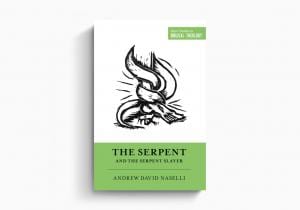All great stories have dragons in them. Harry Potter, Lord of the Rings (I know, I know, they’re only in the background in LotR), that naked one from HBO, even Dealing with Dragons. The Bible is exception insofar as it is true and sets the pattern that all of these fictional stories follow. A pattern outlined and explored in yet another excellent entry in the “Short Studies in Biblical Theology” series, The Serpent and the Serpent Slayer by Andrew Naselli.

In this short book we get a biblical theology of the serpent as the villain of the Bible and his crushing defeat (heh) by Jesus. Beginning with the curse placed upon the serpent in the Garden of Eden, Naselli walks through the storyline of the Bible and touches on the places where conflict arises between God and the serpent. The book ends with the ultimate defeat of the serpent as prophesied in Revelation 12 and 20. Along the way, we get an exploration of the imagery of serpents and dragons (snakes are sometimes good in Scripture–as the bronze serpent that cured snakebite, but more often evil) and the in-context exposition of specific Biblical events (Pharaoh’s and Herod’s massacre of the innocents, for example).
The Serpent and the Serpent Slayer is short, well-written, and interesting. I especially appreciated the discussion of Job. I’ve always found the “Leviathan” passage of Job interesting. Maybe this is because of my interest in political theory and Thomas Hobbes (my day job), or maybe it’s because of my love of Supernatural (where the leviathans were a sadly under-developed class of monsters who absolutely did not deserve to kill Bobby). In any case, Naselli is right to point out that the point of leviathan in Job is to establish that:
“God created these powerful, fear-inducing creatures, and only God can control them. God is God; Job is not. Therefore, Job’s respectful fear of God should surpass his respectful fear of Behemoth and Leviathan.” (63)
Whatever else the passage is doing, Naselli is certainly right about this point.
Again, this little book is excellent. If you haven’t already I strongly encourage you to start a “Short Studies in Biblical Theology” section on your bookshelf and make sure that The Serpent and the Serpent Slayer is on it.
Dr. Coyle Neal is co-host of the City of Man Podcast and an Associate Professor of Political Science at Southwest Baptist University in Bolivar, MO












